18 листопада 2025 р. в межах вивчення дисципліни «Сучасні проблеми менеджменту та Європейська інтеграція України» студенти-магістранти першого року навчання заочної форми освітньої програми «Менеджмент» представили власні презентації на одну з ключових тем, що стосуються базових концепцій європейської інтеграції. Тематика робіт охоплювала широкий спектр питань – від інституцій ЄС та європейського ринку праці до показників економічної нерівності й індексу сприйняття корупції
Підготовлені матеріали засвідчили глибоке опрацювання студентами таких тем, як: історія становлення ЄС та його інституцій, особливості євроінтеграційного курсу України, сучасні виклики для бізнесу в контексті адаптації до стандартів ЄС та Єдиного ринку, а також соціально-економічні проблеми, зокрема нерівність доходів у європейських країнах та Україні.
Важливо, що частина презентацій була виконана англійською мовою, адже курс викладається англійською, що сприяє формуванню фахової англомовної компетентності. Крім того, аналіз європейських інституцій та політик на основі англомовних джерел забезпечив розвиток умінь працювати з автентичною професійною інформацією, як у роботах, присвячених, наприклад, Європейському ринку праці
Представлення студентських робіт дало змогу сформувати низку важливих компетентностей: аналітичну – уміння порівнювати моделі управління та політики ЄС; комунікативну – навички публічних виступів українською та англійською; професійну управлінську – розуміння того, як євроінтеграційні процеси впливають на бізнес, економіку та державне управління; критичне мислення – оцінювання викликів та можливостей, пов’язаних з інтеграцією України до ЄС.
Такі завдання є важливою складовою сучасної конкурентоспроможної освіти для майбутніх менеджерів, адже дозволяють студентам не лише опанувати теоретичні засади європейської інтеграції, а й навчитися застосовувати їх у практичних управлінських контекстах, що є необхідною умовою успішної професійної діяльності в умовах євроінтеграції України.
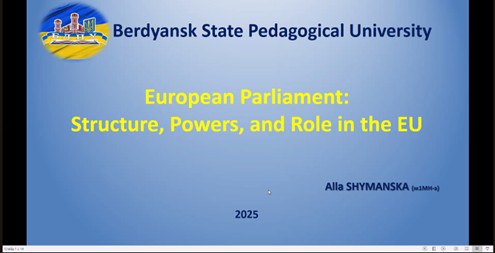
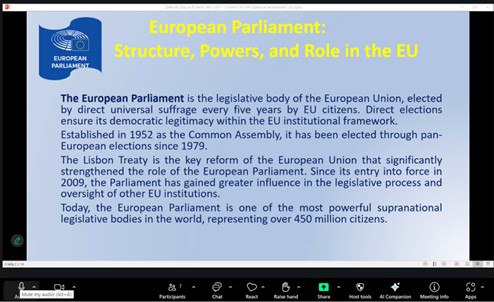
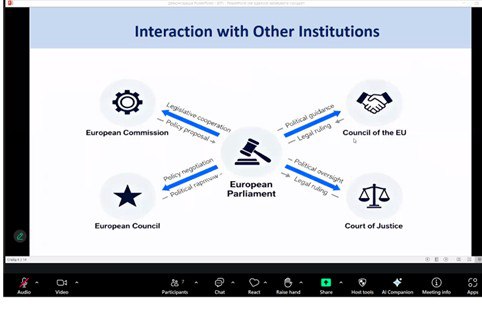
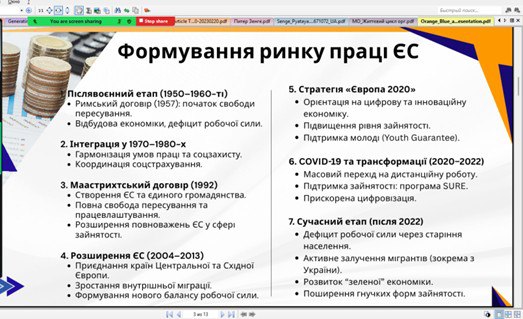
За матеріалами кафедри економіки, менеджменту та фінансів
Master’s Students Presented Their Projects on Basic Concepts of European Integration
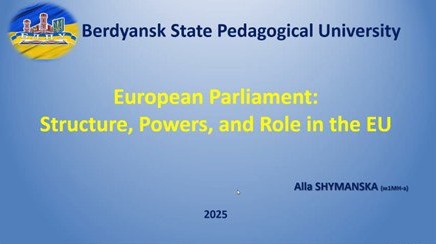
On 18 November 2025, within the framework of the course “Contemporary Problems of Management and European Integration of Ukraine”, first-year part-time Master’s students of the Management educational program presented their projects on key topics related to the basic concepts of European integration. The presentations covered a wide range of issues — from EU institutions and the European labour market to indicators of economic inequality and the Corruption Perception Index.
The prepared materials demonstrated the students’ thorough understanding of such topics as: the history of the EU and its institutions; the specifics of Ukraine’s European integration course; modern challenges for business in the context of adapting to EU standards and the Single Market; as well as socio-economic issues, including income inequality in European countries and Ukraine.
It is important to note that some presentations were delivered in English, as the course itself is taught in English, which contributes to the development of professional English-language competence. Moreover, the analysis of European institutions and policies based on English-language sources helped students enhance their ability to work with authentic professional materials, as seen, for example, in projects dedicated to the European labour market.
The student presentations helped form a set of essential competences: analytical – the ability to compare management models and EU policies; communicative – public speaking skills in both Ukrainian and English; professional managerial – understanding how European integration processes affect business, the economy, and public administration; critical thinking – evaluating challenges and opportunities related to Ukraine’s integration into the EU.
Such tasks are an important component of a modern, competitive education for future managers, as they enable students not only to master the theoretical foundations of European integration, but also to apply them in practical managerial contexts — an essential requirement for successful professional activity in the conditions of Ukraine’s European integration.




Based on materials of the Department of Economics, Management and Finance
